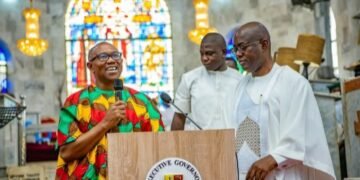Early childhood inclusion and education are necessities for shaping every country’s future, promoting equity, and providing equal opportunities for all children.
In 2017, UNICEF, in a global report titled “Early Moments Matter for Every Child”, raised an alarm about a disturbing trend of how Nigeria was putting its children at risk of under-development, both physically and mentally due to a lack of feasible and effective national policies that can guarantee adequate foundation for their growth.
One of the ways to mitigate such challenges is learning from the progress and successes of advanced countries and one of such countries is Canada. It is pertinent to note that the evident socio-economic differences between Nigeria and Canada make their approach to the topic of early childhood inclusion and education different.
UNICEF, in 2020, reported once again that more than half of Nigerian children under age five risk poor development because they lack early childhood development support. This further amplifies the urgent need for action, perhaps a state of emergency within the Nigerian education sector at all levels, especially with policies and programs that can ensure proper early childhood development support.
Navigating the Canadian education sector these past months have been exciting, revealing and shocking for me, while acknowledging that there are no systems without their flaws. The pros I have seen within the Canadian education sector outweigh the cons especially as it concerns its citizens and other residents. To bring down the absurd statistics that currently characterize Nigerian child education, like 18.5 million children being out of school in Africa’s most populous country with 60 per cent of that figure being girls, there are some valuable lessons that Nigeria can learn from Canada’s approach to early child development for national growth and sustainable development.
Seeable evidence shows that the Nigerian government recognizes the essence of early childhood education and is actively working to improve access to quality childhood education through policy initiatives and partnerships. But the results are too slow-paced due to many factors that hinge on political will and implementation deficits. Some of these factors include underfunding of the education sector, misappropriation of limited resources, infrastructure deficits and others that hinder the delivery of inclusive programs.
Canada on the other hand places a strong emphasis on early childhood education as, not just a step in academic advancement, but as a fundamental right. The country constantly adopts new research that seeks to understand the concept of quality in early childhood settings, and they make these research findings and recommendations the foundation for designing new policy and program initiatives that improve the delivery and quality of child education.
Canada has well-regulated childcare, preschool, and kindergarten programs that prioritize total child development, early literacy, and social skills. Inclusive practices are promoted as early as infanthood, to accommodate children with diverse backgrounds and needs in the mainstream education scene.
Nigeria, especially the public education sector, can learn from Canada’s commitment to parental involvement and family engagement in early childhood education. Canada recognizes the crucial role of parents and families in a child’s education and provides support mechanisms such as parent-teacher associations, parent education programs, and family resource centres.
Involving parents in the learning process strengthens the partnership between educators and families and enhances children’s overall development.
This particular aspect needs to be revisited in Nigeria’s early childhood inclusion and education, as the socio-economic gap in the society makes only a section of the society have access to such opportunities, while the vast majority of children who attend public schools have to struggle for attention in inadequate and dilapidated learning institutions and make do with outdated practices that do not necessarily contribute the support mechanisms to the average public school pupil’s integration into contemporary society and sets them back in what is globally obtainable for childhood development support.
Another valuable lesson for Nigeria lies in Canada’s emphasis on play-based learning. Both countries acknowledge the significance of play in early childhood education, as it supports creativity, problem-solving skills, social interaction, and cognitive development.
However, Nigeria needs a political, social and economic atmosphere that will encourage the incorporation of play-based approaches into its early childhood curricula, to be able to harness the benefits it offers to young children’s holistic growth just like Canada does.
Additionally, Nigeria can draw some guidance from Canada’s well-established systems and commitment to inclusive education. Canada’s comprehensive approach to education at all levels serves as a solid foundation, ensuring accessible and high-quality early childhood education.
While understanding that Nigeria is many years behind when compared to Canada’s socio-economic advancement, it is never too early or late to address accessibility and affordability challenges, especially for marginalized and disadvantaged populations that make up the larger fraction of Nigeria’s population.
Conclusively, Nigeria is not without its achievements/accomplishments within the education sector but there are so many areas requiring improvements, many of which can be learned from other countries that have their systems optimized for maximum efficiency. An example of this is Canada’s approach to early child inclusion and education.
By placing a stronger emphasis on parental involvement, incorporating play-based learning, and establishing comprehensive solutions to age-long challenges, Nigeria can enhance access, quality, and inclusivity in early childhood education. Through these efforts, Nigeria can pave the way for a brighter future, nurturing young minds and building a more inclusive nation.
•Dr. Ayodele writes from Ontario, Canada.





























